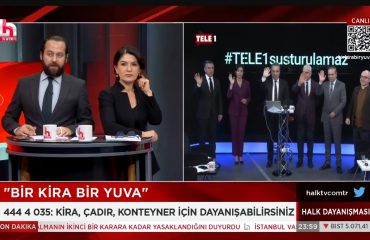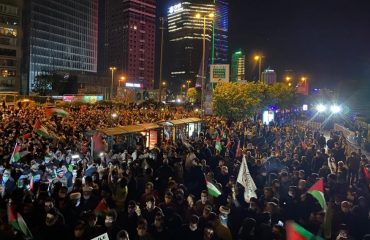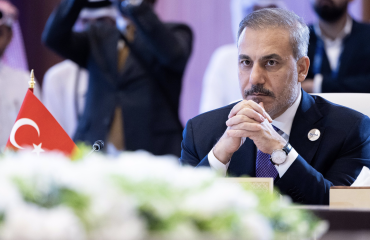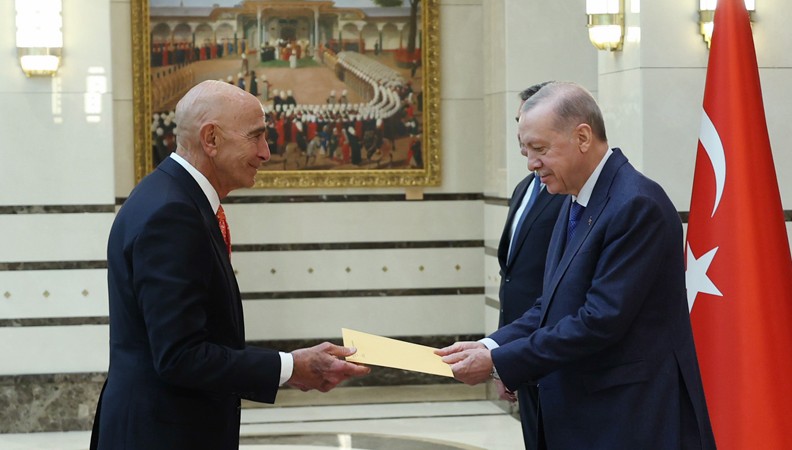

US Ambassador Thomas Barrack presents his credentials to President Tayyip Erdoğan on May 14. Barrack is also US President Donald Trump’s Special Envoy for Syria. (Photo: Presidency)
US Ambassador to Ankara Thomas Barrack made an important statement on his “X” account in the evening hours of May 25. Barrack wrote that the US is against the partition of Syria, that it is not in favor of an attempt similar to the Sykes-Picot agreement of a century ago, in which he wrote “the West” divided the Middle East along “imaginary borders (…) for imperial gains” and that it wants to move forward in the region together with Türkiye, the Gulf countries and Europe.
Barrack’s message was also released in Turkish on the “X” account of the US Embassy in Ankara, possibly to avoid translation errors or deliberate distortions.
Just a few days ago, on May 21, Ambassador Barrack was also appointed Special Envoy for Syria by US President Donald Trump. The day before, on May 24, he had met Syrian Interim President Ahmed Shara, who was in İstanbul for talks with President Tayyip Erdoğan. The US has not yet reopened its embassy in Damascus, and in this transitional period, the Trump administration seemingly wants to conduct Syrian affairs through Türkiye. This also means linking the new US Middle East policy with Ankara’s project for a political solution to the chronic Kurdish problem through the disarmament of the PKK.
What else did Barrack say?
In an important message for US policy in the region, Barrack said:
• “A century ago, the West imposed maps, mandates, penciled borders, and foreign rule. Sykes-Picot divided Syria and the broader region for imperial gain—not peace. That mistake cost generations. We will not make it again.
• “The era of Western interference is over. The future belongs to regional solutions, but partnerships, and a diplomacy grounded in respect. As President Trump emphasized in his May 13th address in Riyadh, “Gone are the days when Western interventionalists would fly to the Middle East to give lectures on how to live, and how to govern your own affairs.”
“Türkiye, the Gulf states and Europe”
In his written statement, Barrack listed the countries with whom the US would like to partner on Syria, emphasizing “imaginary borders” and saying that he did not want the region’s turmoil to lead to map changes:
• “Syria’s tragedy was born in division. Its rebirth must come through dignity, unity, and investment in its people. That starts with truth, accountability—and working with the region, not around it.
• “We are standing with Türkiye, the Gulf, and Europe—this time not with troops and lectures, or imaginary boundaries, but shoulder-to-shoulder with the Syrian people themselves. With the fall of the Assad regime the door is open to peace—by eliminating sanctions we are enabling the Syrian people to finally open that door and discover a path to renewed prosperity and security.”
No Kurdistan in the picture
This means that the United States is in favor of preserving the territorial integrity of Syria, which Türkiye has long emphasized. This is bad news for Israel, for Russia and Iran, which have lost a lot of power in Syria with the fall of Assad, and for the PKK and its supporters, who are now apparently outside the US.
In the picture drawn by Barrack, there is no Kurdistan because there is no map change. Interim President Shara had previously declared that he did not want a federation in Syria.
In Trump’s May 14 meeting with Shara, Saudi Crown Prince Mohammed bin Salman and President Erdoğan, who joined by phone, Trump asked them to take over the management of al-Hol and other detention camps for DEASH (ISIS) militants and their families as a condition for lifting sanctions. Erdoğan stepped in and said that Turkish security forces could assist Damascus in managing the camps, which are currently guarded under US supervision by the YPG-based SDF, the Syrian branch of the PKK.
And what about Israel?
For the curious, it is worth reminding. The Russian Revolution of 1917 exposed the secret Sykes-Picot agreement signed in 1916 between Britain and France, with Russia’s encouragement, to divide the Turkish Empire under the Ottoman dynasty. When it was revealed that a Jewish state was not included in the map drawn with the suggestions of Sharif Hussein of Mecca, who would later establish Saudi Arabia, the Rotschild family demanded the repayment of the loans they had given to Britain, and Britain issued the Balfour Declaration of 1917, which is considered the basis for the establishment of Israel.
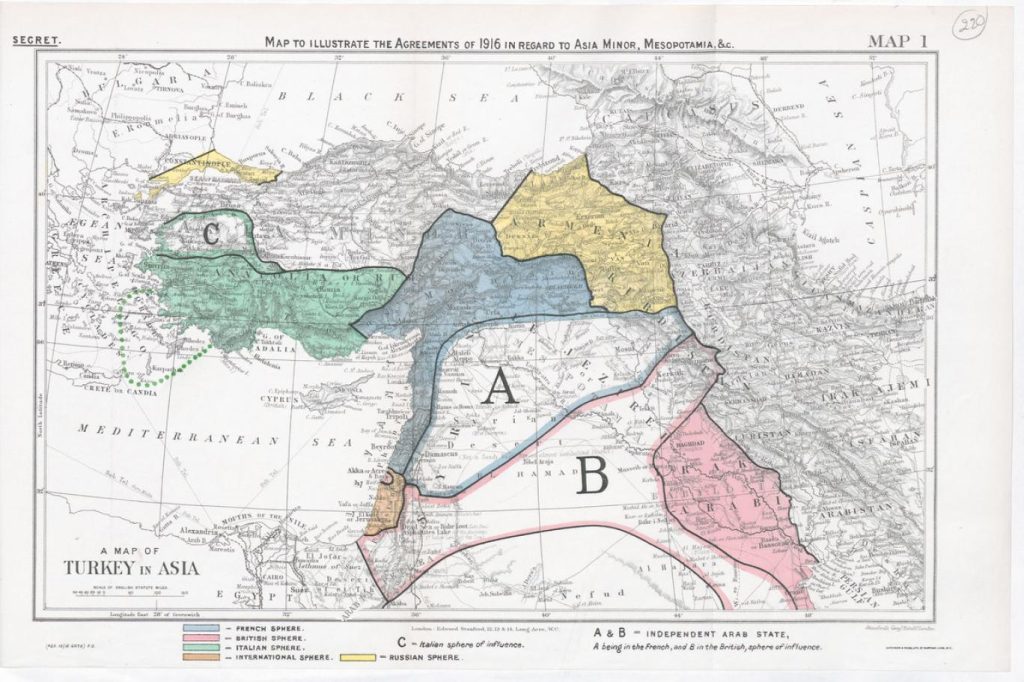
Map showing the division of Türkiye into French, British, Russian and Italian zones of influence according to the secret Sykes-Picot agreement. The 1920 Sévres Treaty imposed on the country was rejected throuh the War of Liberation lead by Mustafa kemal Atatürk and the Turkish Republic was establised in 1923, replacing the Sultanate of the Ottoman Dynasty rıule since 13th Century.
Today, the US has common interests with Türkiye not only in Syria and the Middle East, but also in Russia-Ukraine, Azerbaijan-Armenia, Libya and the Eastern Mediterranean, Africa and the Balkans (especially against China). The circumstances today are very different.
For those who have forgotten, it is worth reminding: Since the establishment of the Islamic Republic in 1979, US-Iranian relations have been conducted through the US Embassy in Ankara. This means that Barrack has responsibility and authority beyond the Turkish Embassy, which is important in its own right, almost like a regional governor.
The triangle in Trump’s mind
Trump seems to have recognized the validity of Türkiye’s strategy, developed after the July 15, 2016 military coup attempt, to participate in game-building over game-breaking in this vast geography.
On the other hand, it is also understood that Trump does not want to base US policy in the Middle East on the racist-religious aggression of Benjamin Netanyahu’s administration. In Trump’s mind, the Türkiye-Saudi Arabia-Israel triangle seems to be a target whose multiplier effect goes beyond the Middle East.
However, when Israel has expelled the Palestinians in Gaza from the land they have lived in for thousands of years with the political protection and military support of the United States and has set its sights on Ramallah, when maps of the division of Syria into Druze, Alawite and Kurdish regions are being circulated internationally, it is very difficult for Türkiye to make peace with Israel; even Erdoğan’s convincing the public of this could lead to heavy vote losses. Let’s put it this way, it is very difficult as long as Netanyahu’s aggression continues.
Trump gives the impression that he wants to establish through dialogue what previous administrations, especially those posing as doves of peace, wanted to impose through war, with a smart merchant approach.
Barrack’s statement is also important in this respect.
